We booked a soft sleeper which was very comfortable. There are 4 berths, two below and 2 above, in each compartment. All are well cushioned and sheets, pillows and a quilt like cover are provided. In contrast to first class sleepers on Indian Railways, the lower berths don't fold up into seats. On the Indian trains, the berth has a tall back and a narrower seat. During the day, you lift the back up and you have a nice comfortable seat to sit on. Everyone sits on the lower berths during the day. At night, you fold down the back and get a wider bed to sleep on. At this point the occupant of the upper berth takes his- or her-self off to the upper regions. This also provides a bit more space between the berths during the day.
The Chinese train didn't seem to have this fold down feature. There was a cushioned back rest on the wall and the berth was wide enough to sleep on. This meant it was not all that comfortable during the day to sit on and my back was not happy despite using pillows as cushions. There is a door which can be closed off at night for privacy. Above the door, there is a space to put suitcases. You have to lift them up over the top berth's height to get them in there. We did it in two stages. Put them on the top berth. Then climb up onto the top berth and lift them up the couple of feet to slide into the space. The space was large enough for 4 carry-on sized suitcases. One could also put suitcases under the lower berths if they were not very high. Our roll-along carry-on sized suitcases did not fit. They were too tall when laid flat on the ground.
The prices are higher for the lower berths. The occupant of the upper berth, if not related to the occupant of the lower berth, has to stay up there or sit politely for a while on the lower berth. It definitely is not something that my upper berth companion did a lot. There are also fold down seats in the hall way outside the door that one can use to look out of the window on the other side. She spent some time on those seats also but they don't have backs. I couldn't sit on them for too long. Since we had one upper and one lower berth, I spent most of my time on the lower berth.
The train has large windows - all the better to see the surrounding vistas. In looking back at my photos, I remembered that I took most of the pictures with our DSLR camera because they were so beautiful. Therefore, you are stuck with the few that I took with my phone, which is my primary means of photography.
We left at 4 pm from Xining. At first we rolled past grasslands that had sheep and cows grazing on them. There is also a lovely lake that one passes about an hour out of Xining. Darkness came way too early, around 8 pm. We had brought food - some rotis that Indians use as travel food, and snacks. We also had ready-to-eat shelf stable meals, disposable plates and spoons and a metal container. All Chinese trains, and train stations, and airports, have hot and cold drinking water dispensers. Tea containers are ubiquitous and people refill them regularly at these places. My plan was to get hot water in the metal dish and heat up the bag with the meal, changing the water out as needed. But we had no appetite so we stuck with just the rotis and snacks and water the entire 24 hours. We didn't even investigate the dining car because it was packed when we looked. We had 4 bottles of water that we went through without any difficulty.
Our traveling companions were a Chinese business man, on the lower berth, who was going to Lhasa and a Chinese woman, on the upper berth, who was getting off at an in-between station. The train goes from various places to Lhasa and I don't know where our train originated. Her station was due to arrive at 2 am. She spoke some English, he spoke none. The train goes over a high pass during the night and oxygen is pumped into the coaches to compensate for the thin air. We had read that oxygen masks would be provided, which would deliver a better flow of oxygen in case it was needed. But no amount of asking got us any masks. The train attendant who checked our passports, Tibet permits and tickets said he'd bring them later but none materialized at any point. The oxygen did flow from the vents in the wall, though.
We had started taking medication for high altitude the day before we left. We used this in South America also, and didn't see any reason to avoid it. But we were worried about getting sick inspite of the medication. We needn't have been. We didn't get any symptoms of altitude sickness but we did find the thin air physically exhausting. It wasn't too bad on the train as we didn't do anything except sit around. I had brought knitting but I spent a lot of time sleeping, watching the scenery go by and taking photos.
The man brought peanuts in the shell and boiled eggs which he shared with us. The woman had a noodle bowl (very common picnic and travel food in China) for dinner and a number of seedless cucumbers for snacking. Cucumbers and cherry tomatoes are considered fruits here and are sold in the fruit shops and I've been given cherry tomatoes for dessert along with cut fruit. Peanuts in the shell, or nuts/seeds in the shell are also a common travel food in China. It helps pass the time and provides for snacking. Sunflower seeds in the hull are also popular. We ate a few of the peanuts but declined the eggs. He had a friend on the train who visited us from time to time. The friend was more talkative than our compartment-mate. I have a Chinese dictionary on my phone and we used that and a lot of pantomiming to communicate. We plugged in my multi-USB charger into the one outlet and charged all our phones at once. My husband's bluetooth headphones were of interest and I tried to get them to work on the Chinese Android phone but couldn't find the setting to pair the headphones with the phone.
The woman did some translation while she was there as she spoke some English. She said she was rusty as she hadn't spoken since she left school. But her English was a lot better than my Mandarin. We used the dictionary with her also to ask about the oxygen masks. The train attendant came and woke her up about an hour before her station, so she could get ready. I thought that was a nice service, but I would have set my own alarm anyway.
I found the upper berth quite comfortable and slept well but was still tired due to the altitude (or the sitting around, take your pick). I slept in so missed some of the early morning light on the mountains. My husband said he got some beautiful photos but I haven't had a chance to look at all of them yet. Hence no photos from that set here.
The water on the ground was frozen in the morning. We passed streams and puddles that were frozen white. There wasn't any snow on the ground though.
That rose in the middle of the photo is the decor in the cabin. There was a table near the window with the rose in a vase and a thermos on it. Our cabin-mate was using the rest of the table for food so we didn't get to use much of it at all.
You can see more of the interior decor here.
We didn't see any trees in the morning. It was all tussocky grass like this. Beautiful lakes occasionally. We also got a bit of commentary via the PA system describing the geography of the area we were going through and also how the train system is being environmentally sensitive. There were fences and we could see yaks and cows grazing. I was surprised at the fences but I'm not sure why.
Lots of power lines everywhere along the train route. That didn't surprise me at all.
One of the lakes we passed. As I said, the vistas were so wide that I decided the DSLR with its telephoto and wide angle lenses was a better vehicle to capture the scenery. One day, I'll post some more photos taken with it.
Time seemed to go by slowly at times and fast at others. I expected to be bored out of our minds half way through the trip. I had brought playing cards, knitting, books on my iPad, and my China guide book to keep me occupied. As I said, I knit a bunch but that was it. Before we knew it, we were rolling into Lhasa.
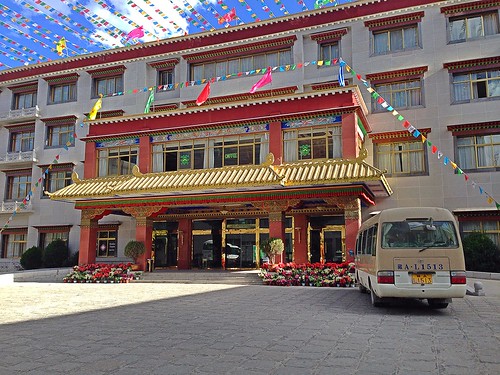
Lhasa station is brand new. It is huge, like most new Chinese stations and airports. We had a rolling carry-on each and then either a backpack or a messenger bag. We also had a plastic bag each with things we needed on the train like toilet paper, water bottles, snacks, etc. as it was not easy to open and close our suitcases on the train. So everything we needed was in the backpack, messenger bag and these two small plastic carry bags.
Usually, when exiting a train station, you have to show your ticket and it is usually collected. In this case, we were asked to also show our passports and were promptly escorted to a police checkpoint outside. There were a few Chinese nationals who had to go through this also. They don't have passports, just their ID cards. The police lady made a copy of our passports and the permit and let us go.
The sun was hot and bright at 4 pm. We had to haul our luggage and ourselves a few hundred yards out of the way to the checkpoint and then back over and out to where the cars, guides and families were waiting.
I thought I would die as we walked down towards the people waiting. It was hot, I was out of breath, my messenger bag felt heavy and the suitcase felt as if it was loaded with lead. We met our guide who draped silk scarves around our neck - a common sign of respect in Tibet. Then we had to walk another quarter of a mile to the car park before we could rest. It was the second worst time during the trip - the first being in the station at Xining.
But I survived and we drove off to our hotel to rest. A bit later, our guide met us in the lobby and we walked to the Barkhor for dinner. I was surprised by how tiring it was to walk on flat ground but it was doable at a slow pace. My heart kept racing and I felt as if I was walking through molasses. But the food was good and we were soon tucked into our beds, looking forward to the delights of the next few days.
Oh, and the toilets on the train. Not nearly as bad as I expected and perfectly functional. I had read horror stories on various blogs and it was nothing like that at all. The train overall was not the cleanest that I've seen but it was acceptable. The high-speed trains between Shanghai and other Chinese cities are very clean and set a very high standard. This was more like your average US commuter train. But given that people were on it for days, it was understandable.
One interesting phenomenon in China is that you will see the cleaning crew lined up waiting to get on board. They are usually grouped by coach (1-2 per coach) or for a few coaches (5-7 people) with their cleaning equipment all neatly standing in line. This is also true in the airports. One day I noticed a group of uniformed women clustered under the jetway in an airport. I wondered what they were doing there, till I realized that a) it was raining and b) they had cleaning equipment with them. They were under the jetway for protection agains the rain! They are always uniformed. Uniforms are very popular in China and you can tell staff by their uniforms, whether they are cleaning staff or admin staff, or shop/bank staff, or even the people manning the information booth in the mall.
The Chinese train didn't seem to have this fold down feature. There was a cushioned back rest on the wall and the berth was wide enough to sleep on. This meant it was not all that comfortable during the day to sit on and my back was not happy despite using pillows as cushions. There is a door which can be closed off at night for privacy. Above the door, there is a space to put suitcases. You have to lift them up over the top berth's height to get them in there. We did it in two stages. Put them on the top berth. Then climb up onto the top berth and lift them up the couple of feet to slide into the space. The space was large enough for 4 carry-on sized suitcases. One could also put suitcases under the lower berths if they were not very high. Our roll-along carry-on sized suitcases did not fit. They were too tall when laid flat on the ground.
The prices are higher for the lower berths. The occupant of the upper berth, if not related to the occupant of the lower berth, has to stay up there or sit politely for a while on the lower berth. It definitely is not something that my upper berth companion did a lot. There are also fold down seats in the hall way outside the door that one can use to look out of the window on the other side. She spent some time on those seats also but they don't have backs. I couldn't sit on them for too long. Since we had one upper and one lower berth, I spent most of my time on the lower berth.
The train has large windows - all the better to see the surrounding vistas. In looking back at my photos, I remembered that I took most of the pictures with our DSLR camera because they were so beautiful. Therefore, you are stuck with the few that I took with my phone, which is my primary means of photography.
We left at 4 pm from Xining. At first we rolled past grasslands that had sheep and cows grazing on them. There is also a lovely lake that one passes about an hour out of Xining. Darkness came way too early, around 8 pm. We had brought food - some rotis that Indians use as travel food, and snacks. We also had ready-to-eat shelf stable meals, disposable plates and spoons and a metal container. All Chinese trains, and train stations, and airports, have hot and cold drinking water dispensers. Tea containers are ubiquitous and people refill them regularly at these places. My plan was to get hot water in the metal dish and heat up the bag with the meal, changing the water out as needed. But we had no appetite so we stuck with just the rotis and snacks and water the entire 24 hours. We didn't even investigate the dining car because it was packed when we looked. We had 4 bottles of water that we went through without any difficulty.
Our traveling companions were a Chinese business man, on the lower berth, who was going to Lhasa and a Chinese woman, on the upper berth, who was getting off at an in-between station. The train goes from various places to Lhasa and I don't know where our train originated. Her station was due to arrive at 2 am. She spoke some English, he spoke none. The train goes over a high pass during the night and oxygen is pumped into the coaches to compensate for the thin air. We had read that oxygen masks would be provided, which would deliver a better flow of oxygen in case it was needed. But no amount of asking got us any masks. The train attendant who checked our passports, Tibet permits and tickets said he'd bring them later but none materialized at any point. The oxygen did flow from the vents in the wall, though.
We had started taking medication for high altitude the day before we left. We used this in South America also, and didn't see any reason to avoid it. But we were worried about getting sick inspite of the medication. We needn't have been. We didn't get any symptoms of altitude sickness but we did find the thin air physically exhausting. It wasn't too bad on the train as we didn't do anything except sit around. I had brought knitting but I spent a lot of time sleeping, watching the scenery go by and taking photos.
The man brought peanuts in the shell and boiled eggs which he shared with us. The woman had a noodle bowl (very common picnic and travel food in China) for dinner and a number of seedless cucumbers for snacking. Cucumbers and cherry tomatoes are considered fruits here and are sold in the fruit shops and I've been given cherry tomatoes for dessert along with cut fruit. Peanuts in the shell, or nuts/seeds in the shell are also a common travel food in China. It helps pass the time and provides for snacking. Sunflower seeds in the hull are also popular. We ate a few of the peanuts but declined the eggs. He had a friend on the train who visited us from time to time. The friend was more talkative than our compartment-mate. I have a Chinese dictionary on my phone and we used that and a lot of pantomiming to communicate. We plugged in my multi-USB charger into the one outlet and charged all our phones at once. My husband's bluetooth headphones were of interest and I tried to get them to work on the Chinese Android phone but couldn't find the setting to pair the headphones with the phone.
The woman did some translation while she was there as she spoke some English. She said she was rusty as she hadn't spoken since she left school. But her English was a lot better than my Mandarin. We used the dictionary with her also to ask about the oxygen masks. The train attendant came and woke her up about an hour before her station, so she could get ready. I thought that was a nice service, but I would have set my own alarm anyway.
I found the upper berth quite comfortable and slept well but was still tired due to the altitude (or the sitting around, take your pick). I slept in so missed some of the early morning light on the mountains. My husband said he got some beautiful photos but I haven't had a chance to look at all of them yet. Hence no photos from that set here.
The water on the ground was frozen in the morning. We passed streams and puddles that were frozen white. There wasn't any snow on the ground though.
That rose in the middle of the photo is the decor in the cabin. There was a table near the window with the rose in a vase and a thermos on it. Our cabin-mate was using the rest of the table for food so we didn't get to use much of it at all.
You can see more of the interior decor here.
Lots of power lines everywhere along the train route. That didn't surprise me at all.
One of the lakes we passed. As I said, the vistas were so wide that I decided the DSLR with its telephoto and wide angle lenses was a better vehicle to capture the scenery. One day, I'll post some more photos taken with it.
Time seemed to go by slowly at times and fast at others. I expected to be bored out of our minds half way through the trip. I had brought playing cards, knitting, books on my iPad, and my China guide book to keep me occupied. As I said, I knit a bunch but that was it. Before we knew it, we were rolling into Lhasa.

Lhasa station is brand new. It is huge, like most new Chinese stations and airports. We had a rolling carry-on each and then either a backpack or a messenger bag. We also had a plastic bag each with things we needed on the train like toilet paper, water bottles, snacks, etc. as it was not easy to open and close our suitcases on the train. So everything we needed was in the backpack, messenger bag and these two small plastic carry bags.
Usually, when exiting a train station, you have to show your ticket and it is usually collected. In this case, we were asked to also show our passports and were promptly escorted to a police checkpoint outside. There were a few Chinese nationals who had to go through this also. They don't have passports, just their ID cards. The police lady made a copy of our passports and the permit and let us go.
The sun was hot and bright at 4 pm. We had to haul our luggage and ourselves a few hundred yards out of the way to the checkpoint and then back over and out to where the cars, guides and families were waiting.
I thought I would die as we walked down towards the people waiting. It was hot, I was out of breath, my messenger bag felt heavy and the suitcase felt as if it was loaded with lead. We met our guide who draped silk scarves around our neck - a common sign of respect in Tibet. Then we had to walk another quarter of a mile to the car park before we could rest. It was the second worst time during the trip - the first being in the station at Xining.
But I survived and we drove off to our hotel to rest. A bit later, our guide met us in the lobby and we walked to the Barkhor for dinner. I was surprised by how tiring it was to walk on flat ground but it was doable at a slow pace. My heart kept racing and I felt as if I was walking through molasses. But the food was good and we were soon tucked into our beds, looking forward to the delights of the next few days.
Oh, and the toilets on the train. Not nearly as bad as I expected and perfectly functional. I had read horror stories on various blogs and it was nothing like that at all. The train overall was not the cleanest that I've seen but it was acceptable. The high-speed trains between Shanghai and other Chinese cities are very clean and set a very high standard. This was more like your average US commuter train. But given that people were on it for days, it was understandable.
One interesting phenomenon in China is that you will see the cleaning crew lined up waiting to get on board. They are usually grouped by coach (1-2 per coach) or for a few coaches (5-7 people) with their cleaning equipment all neatly standing in line. This is also true in the airports. One day I noticed a group of uniformed women clustered under the jetway in an airport. I wondered what they were doing there, till I realized that a) it was raining and b) they had cleaning equipment with them. They were under the jetway for protection agains the rain! They are always uniformed. Uniforms are very popular in China and you can tell staff by their uniforms, whether they are cleaning staff or admin staff, or shop/bank staff, or even the people manning the information booth in the mall.
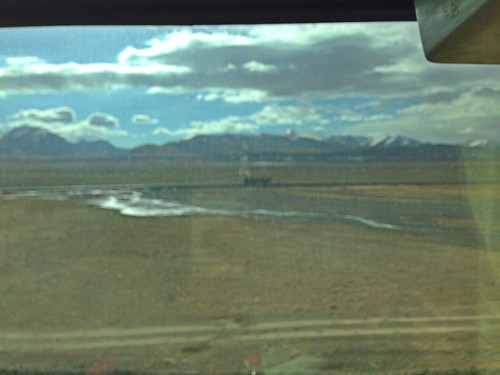
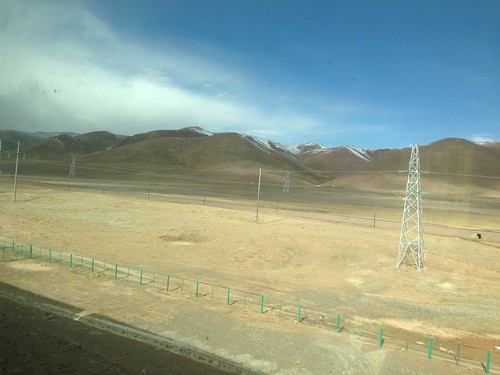
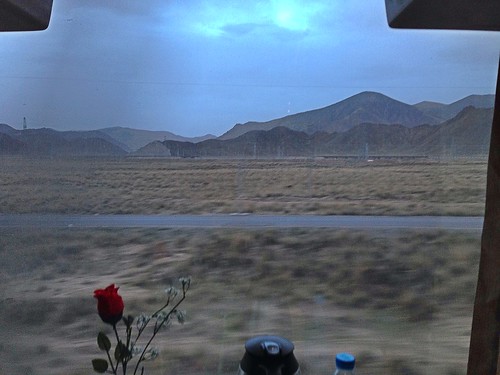
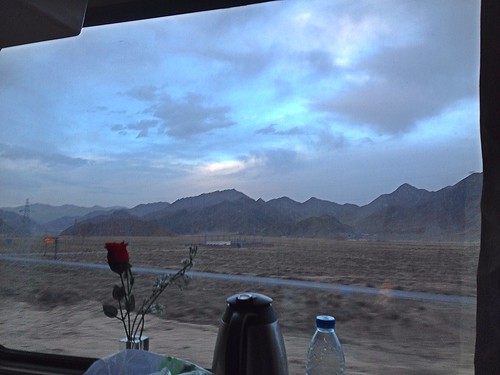
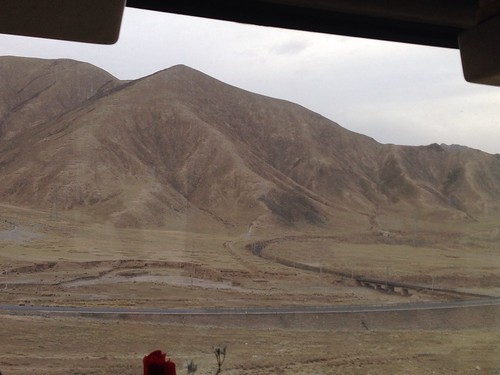
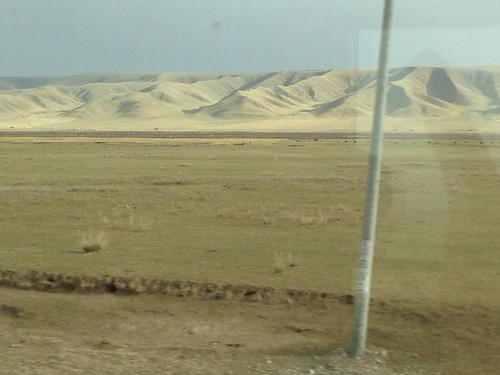
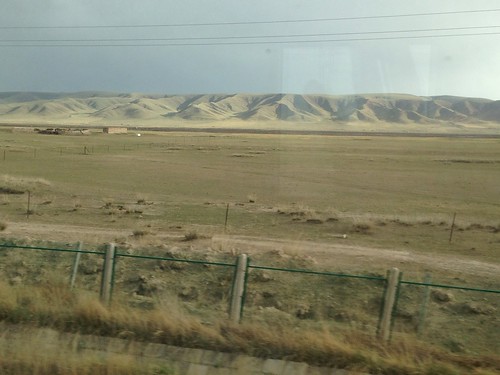
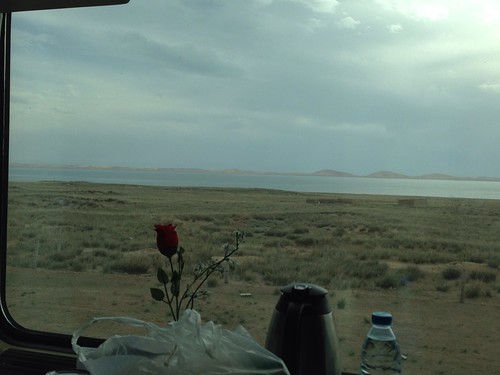
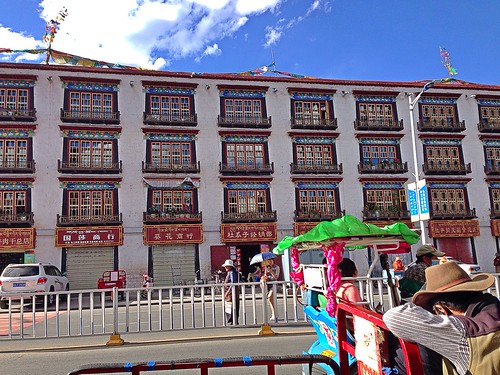
No comments:
Post a Comment